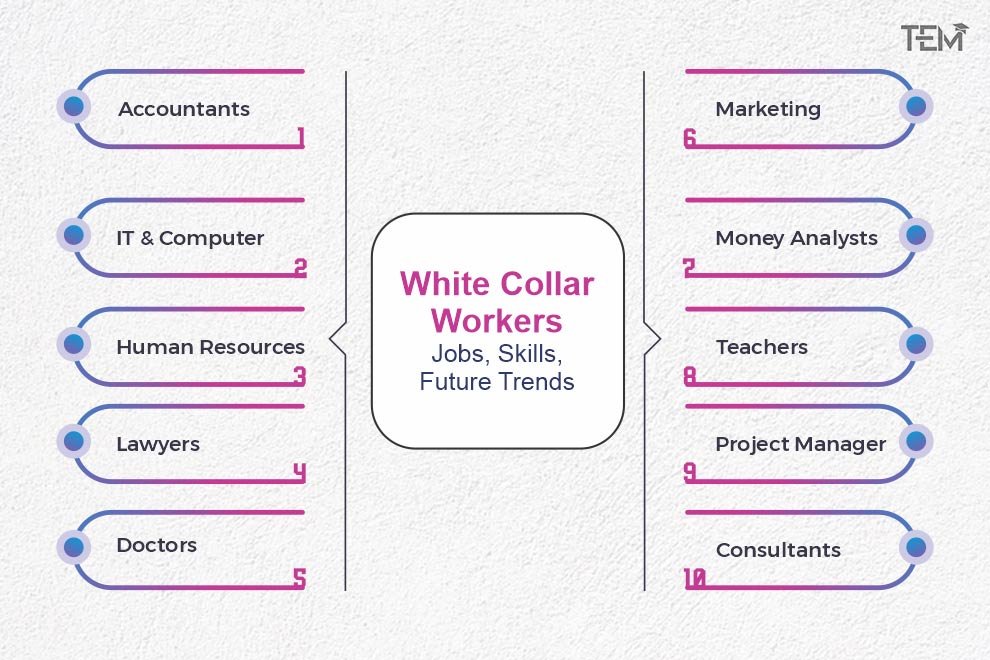What’s a white-collar worker?
Think of people in jobs that use their brains—that’s mostly white-collar work. Not hard labor with your body, but using your mind to manage things, plan, or be a pro at something.
The name “white collar” is kind of old-fashioned, from when office folks wore white shirts, unlike blue-collar workers in tougher jobs who wore blue. Basically, white-collar jobs are office jobs, more about thinking than heavy lifting.
How White-Collar Work Got Here
Way back when factories started getting big—that’s when white-collar work really began. Before that, most people were farmers or craft makers. But big factories needed organizers and managers. At first, white-collar jobs seemed like the better deal—cleaner, safer than blue-collar jobs, you know?
Then, white-collar jobs just kept growing, covering many things like money stuff, health stuff, computers, teaching… everything. And with computers and the internet? Things changed again. Now, loads of white-collar workers can work from home and chat online—normal now.
What Makes a White-Collar Worker… Well, White-Collar?
Most white-collar jobs share a few things:
- It’s Brain Work: Mainly about thinking, solving problems, and planning ahead.
- Usually in an Office (But Not Always!): Offices are typical, but home is becoming really common too.
- Schooling is a Big Thing: You usually need college or special training—often years of it.
- You Need Skills, and They Change: Job skills are key, and they are always changing, always something new to learn.
- You’re often in charge of stuff: You get some freedom in your work, and you’re responsible for making things happen.
- Talking and Writing is Non-Stop: Lots of getting info and giving it out—emails, reports, meetings, the whole deal.
Okay, So What Are Some White-Collar Jobs? Examples Please!
White-collar jobs? Tons of them! Basically, any job where you’re managing, organizing, or using some serious know-how. These jobs take brains, skills, and, yeah, often a good chunk of schooling.
Kinds of White-Collar Jobs: Let’s Break It Down:
Here’s a look at different types of white-collar jobs:
- Accountants & Auditors: Money Watchers. They keep track of money, do taxes (ugh, taxes!), and make sure companies play by the rules. You gotta know your numbers and rules.
Example: Tax people, company money checkers, fraud finders. - IT & Computer Folks: Tech Wizards. They build software, run computer systems, and keep everything online and safe from hackers. Need to be good with code and computers.
Examples: app makers, cyber cops, network builders, and data crunchers. - Human Resources (HR) Crew: People at Work. HR folks hire new people, help employees with problems, handle paychecks and benefits, and make sure the company follows worker laws. You gotta be a people person and know HR stuff.
Example: hiring managers, worker helpers, pay experts, and rule followers for employees. - Lawyers & Legal Eagles: Rule Experts and Problem Solvers. Lawyers give legal advice, defend people in court, and write up legal papers—in all kinds of law, business, crime, you name it. You need a law degree, big time.
Examples: courtroom lawyers, deal makers, legal advisors, and paperwork pros. - Doctors, Nurses, and Medical Staff: Health Heroes. Doctors, nurses, pharmacists, therapists—they figure out what’s wrong with people and make them feel better. Hospitals, clinics, offices—they’re everywhere. One needs serious schooling and licenses.
Examples: heart doctors, kid doctors, nurses on the front lines, therapists for your mind, and pharmacists for your medications. - Marketing & Sales Bosses: Brand Builders and Sales Drivers. They plan marketing campaigns, manage ads, and lead sales teams. They study what people want and how to sell stuff. Gotta be creative, strategic, and good with people.
Example: ad creators, sales leaders, brand managers, market researchers—the ones who get you to buy things (in a good way, hopefully!). - Money Analysts & Advisors: Financial Brains. Financial analysts look at money numbers to help companies make smart choices. Monetary advisors help people and companies plan their money and investments. Numbers whizzes and market experts.
Examples: stock pickers, investment gurus, money planners, and budget bosses. - Teachers & School Leaders: Knowledge Spreaders. Principals, professors, teachers, trainers—they run schools, create lessons, and do research. Lots of schooling and experience in education are needed.
Example: college professors, school principals, lesson planners, education experts—the folks who teach us stuff. - Project Manager: The “Get-It-Done” People: Orchestrators of Projects. They plan projects, keep them on track, and make sure they finish on time and budget in many fields. Organization freaks and certification fans.
Example: building project leaders, tech project chiefs, and timeline masters. - Consultants: The “Ask-Us-Anything” Experts: Problem Solvers for Hire. Consultants give expert advice on management, tech, HR—you name it—to help companies run better. Need to be sharp thinkers and problem-solving pros.
Examples: business fixers, tech advisors, efficiency experts, and strategy gurus.

White-Collar Work: Where Does It Happen?
White-collar work? Usually offices, right? Think computers, office stuff. But the workplace is changing.
- The Office—Still the Classic Offices are still a big part of white-collar work—from cubicles to fancy corner offices, places built for work and teamwork.
- Home Offices are HUGE Now: Working from home? Massive. Thanks to tech, it’s super common. Totally changed things, especially after… well, you know.
- Meeting Rooms & Conference Centers—Where Ideas Clash (in a Good Way): Meetings are still key—with your team, with clients, at big conferences. Where decisions get made, strategies get hatched.
- Travel—Sometimes You Gotta Go: Consultants, salespeople, managers—they often travel. See clients, check on sites, and go to conferences. Could be across town or across the world.
What You Gotta Know and Be Able To Do: White-Collar Skills & Schooling
White-collar jobs need unique skills, sure. But some must-haves are pretty common:
- Education, Education, Education: College degree? Often the starting point. Advanced degrees? Common in many fields. Certifications? For showing you’re a real pro (CPA, PMP, etc.).
- Tech Smarts: No Choice Here: Gotta be comfy with computers and software. Job-specific programs, for sure. General computer skills? Absolutely essential.
- People Skills: Sounds Soft, But They’re hard (and vital): Communication? Big. Problem-solving? Huge. Organization? Yup. Leadership? If you’re moving up. Teamwork? Always. Sounds basic, but these make careers.
- Never Stop Learning: Things change fast. You gotta keep learning, keep training, and keep upgrading your skills to stay relevant. Workshops, courses, new certificates—it’s all part of the deal.
White-Collar vs. Blue-Collar: The Big Showdown!
Okay, white collar vs. blue collar—what’s the actual difference? It comes down to:
| Feature | White-Collar Workers | Blue-Collar Workers |
| Type of Work | Brain work, thinking jobs | Bodywork, hands-on, physical jobs |
| Work Place | Offices, sometimes your couch! | Factories, construction sites, outdoors |
| Skills & School | College often needed soft skills too | Job training, technical skills, being strong |
| Money | Usually better pay, plus benefits | Pay varies a lot, maybe hourly |
| Job Outlook | Can depend on the economy, room to grow | Depends on the industry; maybe union protection |
How This Affects the Economy and Society (Big Picture Stuff)
The white collar/blue collar split? It’s a big deal for money and society.
- Money Stuff (Economics)
- Pay Gap Gets Wider: White-collar folks often earn more, making the gap between rich and less rich bigger.
- Jobs Change with Tech: Tech helps white-collar jobs grow (think tech and management). Some blue-collar jobs… not so much.
- Pay Gap Gets Wider: White-collar folks often earn more, making the gap between rich and less rich bigger.
- Society Stuff (Social):
- Job Status: Still a Thing: White-collar jobs used to be seen as “better.” It still kind of is, even if it shouldn’t be.
- Work-Life Balance: Both Sides Have Issues White collar: stress, long hours. Blue-collar: body strain, injuries. Unique problems, both real.
- Job Status: Still a Thing: White-collar jobs used to be seen as “better.” It still kind of is, even if it shouldn’t be.
Where Do You Find White-Collar Workers? (Industry Breakdown)
White-collar workers? They’re everywhere. But many industries are full of them.
- Finance & Banking: Money management, investments, following the rules.
- Tech & IT: Making software, running systems, cybersecurity.
- Healthcare: doctors, nurses, running hospitals, research.
- Education: teaching, running schools, education research.
- Legal: Lawyers, legal advisors, keeping things legal.
- Marketing & Ads: Selling stuff, advertising, managing sales.
- Consulting: giving expert advice to many businesses.
Schooling and Training: The White-Collar Path
What Schooling Do You Need?
- College Degree—Often Gotta Have It: For tons of jobs (business, finance, computers).
Examples: Accountant? College degree. HR specialist? College degree. You get the idea. - Fancy Degrees: Sometimes You Need More Master’s Doctorates—for certain jobs (law, medicine, professors).
Examples: Lawyer? Law degree. Doctor? Med degree. Professor? PhD. - “Show-Me-You-Know-It” Papers–Certifications: Industry certs prove you’re legit.
(CPA for accountants, PMP for project managers, etc.).
Keeping Your White-Collar Career Going Strong:
- Always Be Learning: Jobs change, tech changes, rules change. Gotta keep learning to stay good. Continuing education is a thing.
- Join the club: professional associations—groups for your networking, resources, and learning stuff. Lawyers have them, project managers have them, and marketers have them.
- Find a mentor (and be a mentor!): Learn from experienced folks; build your network. Your career and help others too.
- Get More Letters After Your Name: More Certificates, More Degrees: MBA, CFA—these boost your skills and open doors.
The Perks of White-Collar Jobs:
- Better Paychecks: Higher salaries reflect the schooling and skills needed.
- Job security is usually more stable, especially in key fields like healthcare and education.
- Nice Workplaces—Offices are Comfy: Clean, climate-controlled, modern offices.
- Climb the ladder—career paths are clearer: to advance, move up, and take on more responsibility.
- Work-Life Balance—Can Be Good: Flexibility, remote work options, decent time off.
- It’s Keep Your Brain Active: Great chances of professional growth. Lots of chances to learn and grow professionally.
- Respect Factor: Society Sees Them as Important: White-collar jobs often carry more social prestige.
The Downsides of White-Collar Jobs
- Stress City: High Pressure: Demanding work, deadlines, and expectations can be brutal.
- Clocking in Crazy Hours: Long workweeks are common, especially in finance, law, and management.
- Desk Jockey Life: Sedentary Problems: Office jobs mean sitting a lot. Health risks are real.
- Job Security—Not Always Guaranteed: Economic shifts, automation—some white-collar jobs are still at risk.
- Learning Never Ends: Continuous Education is a Must Keeping up with certifications and training is time-consuming and costly.
- Competition is fierce: lots of people want these jobs, making it tough to get in, especially without experience.
- Mental and emotional drain: It’s real; decision fatigue; managing people; dealing with clients—burnout is a danger.
White-Collar Jobs Now and in the Future: What to Watch For
Tech & Automation are the real game changers.
- AI and Robots: Taking Over Some Tasks: Automation is handling routine white-collar stuff—data entry and customer service. Good for efficiency, but job worries too.
- Remote Work: The New Normal: Remote work is here to stay. Hybrid models are likely—some office, some home.
- Digital World: Adapt or Get Left Behind: Companies are going digital. White-collar workers must learn digital data analysis, cybersecurity, etc.
- Gig Life: Growing for White-Collar Too, freelance, contract work is expanding. More freedom, but less stability, fewer benefits.
Future Outlook: What to Expect:
- Skills Upgrade: Constant Learning is Key: Always be learning new skills, especially tech skills.
- Hybrid Work—Get Used to It: Mixed office/homework is the future. Companies need to figure this out.
- Soft Skills Rule: Communication, problem-solving, and people skills are super important now.
- Diversity Matters—In a Big Way: A diverse and inclusive workforce is beneficial for companies and their employees.
- Sustainability Counts—Be Green, Be Responsible: Companies care more about being sustainable. White-collar workers are the driving force behind this.
Bottom Line
White-collar workers are super important in today’s world. They drive the economy and make things happen.
The job world is changing fast, so white-collar pros need to keep learning, be flexible, and use both tech and people skills. Understanding white-collar work? It’s key for anyone wanting to succeed in the future.
ALOS READ: How to Unleash the Power of a Psychologically Safe Workplace


